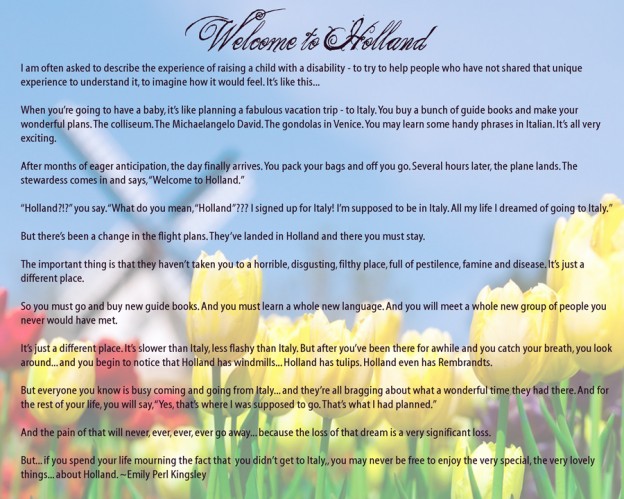The Holland Poem
Informant information:
We received the same submission from 2 sources; both are listed below.
Pam has a daughter who has Down Syndrome. She is seven years old and participates in the “My Own Voice” choir, a choir for children with special needs in Andover, Massachusetts.
Diane has a son who also has Down Syndrome. He is twenty-five years old, and has been a member of the “My Own Voice” choir for several years now, and still participates. “My Own Voice” is a choir for children with special needs in Andover, Massachusetts.
Type of lore: Customary
Genre: Tradition
Language: English
Country of Origin: United States of America
Social / Cultural Context: This poem is passed on to new members of the special needs community by friends, families and even doctors. These new members are family members of children who have been recently diagnosed with various forms of special needs.
The Holland Poem:
“Welcome To Holland”
by Emily Perl Kingsley. c1987 by Emily Perl Kingsley. All rights reserved
I am often asked to describe the experience of raising a child with a disability – to try to help people who have not shared that unique experience to understand it, to imagine how it would feel. It’s like this……
When you’re going to have a baby, it’s like planning a fabulous vacation trip – to Italy. You buy a bunch of guide books and make your wonderful plans. The Coliseum. The Michelangelo David. The gondolas in Venice. You may learn some handy phrases in Italian. It’s all very exciting.
After months of eager anticipation, the day finally arrives. You pack your bags and off you go. Several hours later, the plane lands. The stewardess comes in and says, “Welcome to Holland.”
“Holland?!?” you say. “What do you mean Holland?? I signed up for Italy! I’m supposed to be in Italy. All my life I’ve dreamed of going to Italy.”
But there’s been a change in the flight plan. They’ve landed in Holland and there you must stay.
The important thing is that they haven’t taken you to a horrible, disgusting, filthy place, full of pestilence, famine and disease. It’s just a different place.
So you must go out and buy new guide books. And you must learn a whole new language. And you will meet a whole new group of people you would never have met.
It’s just a different place. It’s slower-paced than Italy, less flashy than Italy. But after you’ve been there for a while and you catch your breath, you look around…. and you begin to notice that Holland has windmills….and Holland has tulips. Holland even has Rembrandts.
But everyone you know is busy coming and going from Italy… and they’re all bragging about what a wonderful time they had there. And for the rest of your life, you will say “Yes, that’s where I was supposed to go. That’s what I had planned.”
And the pain of that will never, ever, ever, ever go away… because the loss of that dream is a very very significant loss.
But… if you spend your life mourning the fact that you didn’t get to Italy, you may never be free to enjoy the very special, the very lovely things … about Holland.
Informant’s Comments:
Pam’s Submission:
Hi Angelina,
My name is Pam, I have a 7 year old daughter with Down Syndrome who participates in the “My Own Voice” choir. My husband and I were trying to think of something specific to tell you but I’m not sure how insightful we can be… I figured you already have the Holland poem ( and your mom said you already have it). but I know that poem was very helpful to me, and has allowed me to put a lot of things in perspective.
The holland poem, rings true during all stages of life as well. Not just as a baby, but a toddler on the playground or a high school kid going to the prom. Similar to the holland poem, is the folklore of everyone sitting in a circle and they all throw their problems in the middle, and after seeing and hearing everyone’s issues, you would always want your own problems back…..Folklore being It is not as bad as you think… Maybe a humbling experience.
Not sure if this is helpful or not. I hope you are doing well at school and enjoying it all! Wishing you luck on your presentation.
Kindly,
Pam
Diane’s Submission:
Hi Angelina, What a great assignment, and of course, we would love to help you out. I hope my contribution is relevant and helps … Take care, Diane
The day after [my child] was born, we received a beautiful teddy bear from my aunt with a framed poem inside the gift bag. The name of the poem was “Welcome to Holland” written by Emily Perl Kingsley (see link below). From day one, it had a very profound effect on me. I read it daily for at least the first year of [his] life, and it served as my own personal support message as we learned about his disability, Down syndrome; and subsequently, grew to love and appreciate him more and more each day. We think [he] is funny, cute as a button, mischievous as all get out, totally awesome, and of course, lights up a room like a huge vase of tulips!
Collector’s comments:
While “Welcome to Holland” itself is a literary text because it is a poem with an author, the act of giving this poem to others is folklore – it is a tradition. Moreover, it can also be considered similar to an initiation ritual – the family is being initiated into the special needs community, and the act of giving them this poem is very similar to rites of transition, because they aim at helping this family transition into this new community/phase of their life.
Tags/Keywords: special needs, tradition, customary, poetry

